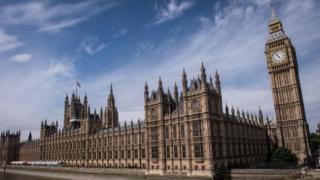 Image copyright
Image copyright
PA
The process for filling senior jobs at public bodies is not transparent despite changes, MPs have said.
The Public Administration and Constitutional Affairs Committee said it was concerned ministers, not the watchdog, set the appointments code.
MPs said they were not assured that candidates would not be deliberately excluded from high profile public appointments on an arbitrary basis.
The government has said that changes have strengthened the process.
Public appointments are ministerial appointments to the board of a public body, such as the National Institute for Health and Care Excellence or UK Sport, or advisory committees.
Last year, officials said changes stemming from a review by the businessman Sir Gerry Grimstone would strengthen current procedures and that transparency and accountability would remain “key elements”.
It came amid reports of increasing intervention by ministers over appointments to key positions, including on behalf of those with links to the Conservative Party.
‘Concerned’
The committee said it had expressed “serious concerns” about the content of the Grimstone proposals.
Its inquiry into the review said that “without extensive amendment, the Grimstone proposals will not and cannot sustain public confidence”.
The inquiry said the proposals “significantly weaken” the powers of the public appointments commissioner – who is in charge of ensuring major public jobs are handed out on merit – as previous powers such as appointing independent assessors were taken away.
Committee chairman Bernard Jenkin said: “We remain concerned that there seems to be an effort by government to weaken the robustness and transparency of public appointments according to the principles established by the very first Committee on Standards on Public Life, under Lord Nolan.”
He added: “We hope that the new commissioner for public appointments will do all he can to defend the Nolan principles on public appointments.”
The committee also said it was “a matter of great concern” that the government, rather than the public appointments commissioner, set the Public Appointments Code.
The government said it had implemented the Grimstone report’s recommendations, including:
- Ministers should continue to make public appointments on merit
- Ministers should be assisted by advisory assessment panels containing a strong element independent of the body being appointed to
- Political activity should not affect any judgment of merit nor should it be any bar to appointment or being a member of a panel
- There should be transparency over significant political activity
- At the start of the recruitment process, ministers should agree the job description for the role, the length of tenure and remuneration
- Ministers must also agree the composition of the advisory assessment panel and how they would be actively informed of the progress at every stage throughout the competition
Public Appointments Commissioner Peter Riddell, a former political journalist and former head of the Institute for Government, took up the role in April last year.
In a letter to the committee, he said some “significant improvements had been agreed”.
“In particular, the key Nolan principle of fairness – stating that ‘selection process should be fair, impartial and each candidate must be assessed against the same criteria for the role in question’- has been reinstated in the Public Appointment Principles after having been omitted in the Grimstone report,” he said.
“Moreover, the shift in powers from the commissioner to ministers over key features of the process has been qualified.
“So instead of the commissioner merely being notified of cases where ministers want an exemption from the normal processes of competition or if they want to appoint someone judged unappointable by an interview panel, they will now have to consult me.”
He said the new arrangements were underpinned by a “more transparent system” where everyone could follow the progress of a competition via a web-tracker on the Cabinet Office website.
Public appointments process not transparent, say MPs}

